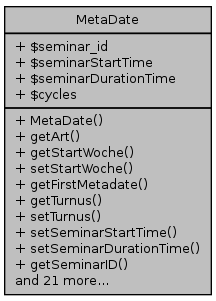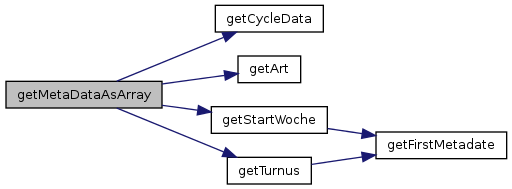Public Member Functions |
| | MetaDate ($seminar_id= '') |
| | getArt () |
| | getStartWoche ($metadate_id=null) |
| | setStartWoche ($start_woche, $metadate_id=null) |
| | getFirstMetadate () |
| | getTurnus ($metadate_id=null) |
| | setTurnus ($turnus, $metadate_id=null) |
| | setSeminarStartTime ($start) |
| | setSeminarDurationTime ($duration) |
| | getSeminarID () |
| | setCycleData ($data=array(), $cycle) |
| | addCycle ($data=array(), $create_single_dates=true) |
| | editCycle ($data=array()) |
| | deleteCycle ($cycle_id) |
| | deleteSingleDate ($cycle_id, $date_id, $filterStart, $filterEnd) |
| | unDeleteSingleDate ($cycle_id, $date_id, $filterStart, $filterEnd) |
| | store () |
| | restore () |
| | delete ($removeSingleDates=TRUE) |
| | sortCycleData () |
| | getCycleData () |
| | getCycles () |
| | getMetaDataAsArray () |
| | getSingleDates ($metadate_id, $filterStart=0, $filterEnd=0) |
| | readSingleDates ($metadate_id, $start=0, $end=0) |
| | hasDates ($metadate_id, $filterStart=0, $filterEnd=0) |
| | createSingleDates ($data) |
| | getVirtualSingleDates ($data) |
| | createSingleDatesForSemester ($metadate_id, $sem_begin, $sem_end, $startAfterTimeStamp, $corr) |
| | getVirtualSingleDatesForSemester ($metadate_id, $sem_begin, $sem_end, $startAfterTimeStamp, $corr) |
| | getVirtualMetaAssignObjects ($metadate_id, $resource_id) |
Member Function Documentation
| addCycle |
( |
|
$data = array(), |
|
|
|
$create_single_dates = true |
|
) |
| |
adds a new cycledate, single dates are created if second param is true
- Parameters
-
| array | assoc, see CycleData, metadate_id must be in $data['cycle_id'] |
| bool | $create_single_dates | |
- Returns
- string|boolean metadate_id of created cycle
| createSingleDates |
( |
|
$data | ) |
|
create single dates for one cycle and all semester and store them in database, deleting obsolete ones
- Parameters
-
| mixed | cycle id (string) or array with 'metadate_id' => string cycle id, 'startAfterTimeStamp' => int timestamp to override semester start |
| createSingleDatesForSemester |
( |
|
$metadate_id, |
|
|
|
$sem_begin, |
|
|
|
$sem_end, |
|
|
|
$startAfterTimeStamp, |
|
|
|
$corr |
|
) |
| |
create single dates for one cycle and one semester and store them in database, deleting obsolete ones
- Parameters
-
| string | cycle id |
| int | timestamp of semester start |
| int | timestamp of semester end |
| int | alternative timestamp to start from |
| int | correction calculation, if the semester does not start on monday (number of days?) |
| delete |
( |
|
$removeSingleDates = TRUE | ) |
|
| deleteSingleDate |
( |
|
$cycle_id, |
|
|
|
$date_id, |
|
|
|
$filterStart, |
|
|
|
$filterEnd |
|
) |
| |
| editCycle |
( |
|
$data = array() | ) |
|
change existing cycledate, changes also corresponding single dates
- Parameters
-
| array | assoc, see CycleData, metadate_id must be in $data['cycle_id'] |
- Returns
- number|boolean
art is no longer used and always 1
- Deprecated:
- Returns
- number
returns cycledates as arrays
- Returns
- array assoc of cycledate data arrays
returns the cycledate objects
- Returns
- array of CycleData objects
returns old style metadata_dates array (more or less)
- Deprecated:
- Returns
- array
| getSingleDates |
( |
|
$metadate_id, |
|
|
|
$filterStart = 0, |
|
|
|
$filterEnd = 0 |
|
) |
| |
returns an array of SingleDate objects corresponding to the given cycle id use the optional params to specify a timerange
- Parameters
-
| string | a cycle id |
| int | unix timestamp |
| int | unix timestamp |
- Returns
- array of SingleDate objects
| getStartWoche |
( |
|
$metadate_id = null | ) |
|
returns start week (Semesterwoche) for a cycledate for compatibility the first cycledate is chosen if no one is specified
- Deprecated:
- Parameters
-
- Returns
- int
| getTurnus |
( |
|
$metadate_id = null | ) |
|
returns the cycle for a cycledate for compatibility the first cycledate is chosen if no one is specified
- Deprecated:
- Parameters
-
- Returns
- int 0,1,2 for weekly, biweekly ...
| getVirtualMetaAssignObjects |
( |
|
$metadate_id, |
|
|
|
$resource_id |
|
) |
| |
returns an array of AssignObjects for one cycle for given room assigns are not stored, used for collision checks before the cycle is stored (for now only in admin_seminare_assi.php)
- Parameters
-
| string | id of cycle |
| string | id of room |
- Returns
- array array of AssignObject
| getVirtualSingleDates |
( |
|
$data | ) |
|
generate single date objects for one cycle and all semester, existing dates are merged in
- Parameters
-
| mixed | cycle id (string) or array with 'metadate_id' => string cycle id, 'startAfterTimeStamp' => int timestamp to override semester start |
- Returns
- array array of arrays, for each semester id an array of two arrays of SingleDate objects: 'dates' => all new and surviving dates, 'dates_to_delete' => obsolete dates
| getVirtualSingleDatesForSemester |
( |
|
$metadate_id, |
|
|
|
$sem_begin, |
|
|
|
$sem_end, |
|
|
|
$startAfterTimeStamp, |
|
|
|
$corr |
|
) |
| |
generate single date objects for one cycle and one semester, existing dates are merged in
- Parameters
-
| string | cycle id |
| int | timestamp of semester start |
| int | timestamp of semester end |
| int | alternative timestamp to start from |
| int | correction calculation, if the semester does not start on monday (number of days?) |
- Returns
- array returns an array of two arrays of SingleDate objects: 'dates' => all new and surviving dates, 'dates_to_delete' => obsolete dates
| hasDates |
( |
|
$metadate_id, |
|
|
|
$filterStart = 0, |
|
|
|
$filterEnd = 0 |
|
) |
| |
returns true if a given cycle has at least one date at all or in the given time range
- Parameters
-
| string | cycle id |
| int | $filterStart | |
| int | $filterEnd | |
- Returns
- bool
| readSingleDates |
( |
|
$metadate_id, |
|
|
|
$start = 0, |
|
|
|
$end = 0 |
|
) |
| |
reload SingleDate objects for a given cycle id
- Parameters
-
| string | $metadate_id | |
| int | $start | |
| int | $end | |
- Returns
- bool
load all cycledates from database
| setCycleData |
( |
|
$data = array(), |
|
|
|
$cycle |
|
) |
| |
internal method to apply cycledate data from assoc array to a given CycleData object. checks the start and endtime and retruns false if wrong
- Deprecated:
- Parameters
-
- Returns
- boolean
| setSeminarDurationTime |
( |
|
$duration | ) |
|
| setSeminarStartTime |
( |
|
$start | ) |
|
| setStartWoche |
( |
|
$start_woche, |
|
|
|
$metadate_id = null |
|
) |
| |
sets start week (Semesterwoche) for a cycledate for compatibility the first cycledate is chosen if no one is specified
- Deprecated:
- Parameters
-
| int | $start_woche | |
| string | $metadate_id | |
- Returns
- null|Ambigous <NULL, unknown>
| setTurnus |
( |
|
$turnus, |
|
|
|
$metadate_id = null |
|
) |
| |
set the cycle for a cycledate for compatibility the first cycledate is chosen if no one is specified
- Deprecated:
- Parameters
-
| int | 0,1,2 for weekly, biweekly ... |
| string | $metadate_id | |
- Returns
- int
sort cycledates by sorter column and date
store all changes to cycledates for the course, removed cycles are deleted from database
- Returns
- int > 0 if changes where made
| unDeleteSingleDate |
( |
|
$cycle_id, |
|
|
|
$date_id, |
|
|
|
$filterStart, |
|
|
|
$filterEnd |
|
) |
| |
Field Documentation
The documentation for this class was generated from the following file:






























